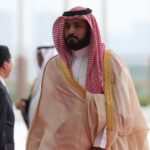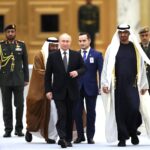Summary by Geopolist | Istanbul Center for Geopolitics:
Qatar’s investments in Asia have been expanding, driven by a mix of economic opportunities and geopolitical strategies. The country is focusing on diversifying its investments across various sectors, including technology, real estate, and infrastructure, to reduce reliance on hydrocarbons. These investments also aim to strengthen diplomatic ties and economic partnerships with key Asian nations, balancing economic interests with geopolitical considerations. The trend reflects Qatar’s broader strategy of enhancing its global influence through strategic economic engagements in rapidly growing Asian markets.
Read the full article below.
Nearly two decades ago, the Qatar Investment Authority (QIA), the Qatari Sovereign Wealth Fund, was established to invest excess revenue from energy exports in foreign enterprises. Its mission is “to protect and grow Qatar’s financial assets and diversify the economy.” In addition to economic and financial objectives, these investments are crucial in enhancing Qatar’s political influence, serving as a tool for soft power projection and to keep the audience informed about the broader implications of the country’s investments.
The Qatar Investment Authority’s (QIA) investment portfolio is a testament to its dynamic approach. While it continues prioritizing Europe, with substantial investments in real estate, finance, and renewable energy, it also holds key investments in global giants like Volkswagen and Porsche. These choices reflect a strategy of supporting established firms with growth potential. Moreover, its Barclays and Credit Suisse holdings strengthen its financial sector presence. Through wind and solar projects, QIA actively promotes Europe’s shift to a low-carbon economy. Over the past two years, QIA has diversified its investments into energy transition, semiconductors, aerospace, AI, digital tech, healthcare, hospitality, and culture. This dynamic diversification indicates Qatar’s evolving and forward-thinking investment strategy.
New frontiers for Qatari markets/investments
However, in a display of strategic foresight, Qatar has also initiated efforts to broaden its foreign investments beyond Europe and explore opportunities in other regions following the onset of COVID-19 a few years ago. As CEO of QIA, Mansoor Ebrahim Al-Mahmoud recently affirmed, “There is a clear mandate to prepare the institution to handle more inflows in the coming years.” This shift, a testament to Qatar’s strategic foresight, suggests increased expenditure in Asia and the United States (U.S.), focusing on climate change, infrastructure, and digitalization. “We will continue to deploy in the continent [Europe], but a larger share of our investments will be going to the other two regions, given the opportunities we see in the U.S. and places like China and India,” Al-Mahmoud elaborated.
QIA is increasing its investments in technology, participating in funding rounds for companies like Swiggy in India and Ensoma in the US. It now prioritizes the semiconductor sector and software and collaborates with private equity firms on tech buyouts. QIA has shifted its focus to India, China, and Southeast Asia, moving away from traditional investments in European listed companies. This pivot, driven by the superior GDP growth trajectories forecasted for Asia, which is anticipated to account for over 60% of global GDP in 2024, holds the promise of significant economic benefits for Qatar, fostering a sense of optimism for the future.
Indeed, Asia’s growing influence in global supply chains offers significant opportunities to enhance Qatar’s food security and green energy goals. This shift highlights QIA’s skill in identifying and leveraging economically and strategically important regions.With assets over $526 billion, QIA is the world’s 8th-largest sovereign wealth fund, investing now in equities, start-ups, tech firms, health, fixed income, real estate, private equity, and infrastructure. For example, QIA has invested in Alibaba and Tencent in China and India’s digital economy through Jio Platforms, aligning with QIA’s strategy to enter high-growth markets and harness technological advancements. (see Table 1).
Qatar’s investment strategy shift also aligns with Qatar’s government goals in its third National Development Strategy (launched this year). Key sectors like manufacturing, tourism, and digital services are emphasized to advance Vision 2030. Qatar’s Asian investment strategy aims for sustainable growth and a better quality of life for its citizens, as seen in partnerships with Chinese companies like BYD and Qatari Mannai for electric vehicles. Kingdee International Software Group and QIA investments support global digitalization. Meanwhile, QIA’s funding for Oricell Therapeutics in February 2023 reflects Qatar’s growing interest in health and biotech, providing reassurance about the coherence of Qatar’s economic policies.
In this context, India’s significance is undeniable. The IMF ranks it as the world’s fifth-largest economy, set to surpass Japan next year and Germany by 2027, becoming the third largest globally.The QIA has focused its investments in India on venture capital, especially online retail, including Swiggy, Rebel Foods, and Flipkart. QIA is also boosting investments in Southeast Asia, with notable contributions like $300 million in Malaysia’s Carsome and over $500 million to Indonesia’s ‘10 New Balis’ tourism project.
Meanwhile, Qatar’s engagement with Central Asia reflects its broader strategy of diversifying investments globally and strengthening economic partnerships. Central Asia presents investment opportunities for Qatar in agriculture, infrastructure, transportation, finance, and energy. It also offers a link to China’s Belt and Road network. Qatar’s regional strategic interests are driven by economic and geopolitical factors, engaging with major powers like China, Russia, Europe, Iran, and Turkiye. Collaborating in Central Asia could strengthen Qatar’s partnership with Turkiye.
Qatar’s Emir Sheikh Tamim bin Hamad al-Thani’s recent visit (June 2023) to Central Asia highlights Qatar’s aim to strengthen international ties and forge new connections. This interest is evident in Qatar’s bid to become a dialogue partner in the Shanghai Cooperation Organization (SCO), aligning with regional policies of Iran, Saudi Arabia, and the UAE.
Expanding Energy markets
Qatar’s investment strategy extends beyond simple financial returns to include a strategic focus on cultivating diplomatic relationships and expanding its energy export base. Qatar enhances its political and economic partnerships by investing in various regions and sectors, improving its position in the liquefied natural gas (LNG) markets. Indeed, Qatar is heavily investing in LNG, with plans to expand its North Field LNG project, aiming to nearly double its capacity to 142 million tons per year (mt/y) by 2030.This expansion targets significant growth opportunities in markets such as China, India, and Southeast Asia.
China is Qatar’s largest LNG market, and recent contracts with Chinese companies could make Qatar the top LNG supplier to China by 2026, surpassing Australia. India’s growing LNG demand and import capacity make it a key market despite being smaller than Europe and China. In February 2024, QatarEnergy renewed its contract with India’s Petronet LNG for up to 7.5 mt/y starting May 2028.xxi Southeast Asia, led by Vietnam, the Philippines, Indonesia, Malaysia, and Thailand, offers significant opportunities. Plans to double gas-fired power capacity and increase LNG import capacity by 80% require over $220 billion in investment.
Geopolitical considerations
Yet despite Doha’s strong ambition to diversify its foreign investments, particularly in Asia, for numerous reasons, including achieving higher financial returns, mitigating investment risks, and bolstering economic partnerships in the energy sector, Qatari investments in the region remain limited. According to Global SWF estimates, over 90% of the Qatar Investment Authority’s (QIA) total portfolio is concentrated in Qatar, Europe, and the U.S., and around 7% in Asia.
It is important to note that Qatar’s financial ventures in Asia are relatively new. As Qatari investors explore these emerging markets, they may need time to acclimate and expand their investments across different industries and countries. Notably, the Qatar Investment Authority (QIA) only established its offices in Singapore in 2021 and has since been actively pursuing investment opportunities throughout Asia, including Japan.
Geopolitical factors are becoming more crucial, particularly given the intensifying competition between the U.S. and China within the technology sector. Numerous Western countries, led by the U.S., have raised concerns about Chinese investments and influence. As Qatar strengthens its economic ties with China, this partnership is expected to undergo increased scrutiny and will necessitate careful diplomatic approaches to manage potential tension.
To be sure, Qatar is investing significantly in the U.S.. According to the U.S. Department of State, Qatar invested over $45bn in the U.S. economy as of March 5, 2024. Fitch Solutions expects Qatar’s investment in the U.S. will continue to expand.xxvi Qatar hosts Al Udeid Air Base (AUAB), the largest U.S. Air Force base outside the U.S., home to CENTCOM and AFCENT Forward Headquarters. This base supports U.S. and Coalition operations beyond the Middle East. In January 2022, President Biden designated Qatar as a major non-NATO Ally.
Qatar, the U.S.’s tenth-largest Foreign Military Sales (FMS) partner, has over $25 billion in active FMS cases. Recent agreements have significantly invested in AUAB. In January 2024, the U.S. extended its AUAB presence for ten more years, solidifying ties amid rising Middle East tensions and wars.xxvii Indeed, the geopolitical landscape requires Doha to meticulously balance its economic and strategic interests, a task it has skillfully managed thus far.
Table 1: Qatar’s recent transactions in Asia (Selected investments since 2022)
| Country/ Region | Country | Investment | Sector | Year | Value ($) |
| China | China | Alibaba Group | Technology | 2022 | $600 million |
| China | Cainiao (Logistics Arm of Alibaba) | Logistics/E-commerce | 2022 | N/A | |
| China | Contemporary Amperex Technology Co. Ltd. (CATL) | Green Energy/EV | 2023 | N/A | |
| China | Tencent | Technology/Digital | 2022 | N/A | |
| China | WuXi XDC Cayman Inc | Health/Cancer treatments | 2023 | N/A | |
| China | Kingdee | B2B/Enterprise software | 2023 | 205 million | |
| India | India | Byju’s | Education Technology | 2022 | $150 million |
| India | Zomato | Food Delivery/Tech | 2022 | $100 million | |
| India | Paytm | Fintech | 2022 | $200 million | |
| India | Byju’s | Education Technology | 2022 | $250 million | |
| India | Swiggy | Food | 2022 | $700 million | |
| India | Byju’s | Education Technology | 2024 | $200 million | |
| India | Adani Green Energy | Renewable Energy | 2023 | $473million | |
| India | Reliance Retail | Retail | 2023 | $1 billion | |
| South Korea | South Korea | SK on EV Battery manufacturer | energy transportation vehicle production energy storage | 2022 | $500 million |
| Japan | Japan | Kokusai Electric Corporation | Semiconductor manufacturing | 2023 | N/A |
| Southeast Asia | Indonesia | Gojek (GoTo Group) | Technology | 2022 | $100 million |
| Singapore | Ant Financial’s Singapore Unit | Fintech | 2022 | N/A | |
| Malaysia | Carsome | Online platform for automotive | 2022 | $300 million | |
| Singapore | Data Centers | Infrastructure/Tech | 2023 | N/A | |
| Malaysia | Pavilion Kuala Lumpur | Real Estate | Ongoing | N/A | |
| Thailand | Minor International | Hospitality | Ongoing | N/A | |
| Philippines | Manila Water | Utilities/Infrastructure | Ongoing | N/A | |
| Central Asia | Kazakhstan | KazMunayGas | Energy | 2022 | $1 billion |
| Kazakhstan | Infrastructure Development | Infrastructure | 2023 | $500 million | |
| Uzbekistan | Sovereign Wealth Fund Collaboration | Multi-sector | 2022 | N/A | |
| Turkmenistan | Energy Sector Investments | Energy | 2023 | N/A |
Note: Investments valued at $100 million or more are included.
Sources: Companies, Media reports, Dealroom.co
Table 2: QIA’s Portfolio Analysis
| By Country | No. Investments | By Industry | No. Investments | By Round | No. |
| United States | 34 | Health | 22 | Growth Equity | 15 |
| India | 11 | Enterprise Software | 7 | Late VC | 12 |
| China | 7 | Transportation | 7 | Series C | 11 |
| United Kingdom | 6 | Energy | 7 | Series D | 10 |
| Germany | 4 | Food | 6 | Series B | 9 |
| Türkiye | 2 | Fintech | 5 | Growth Equity Non-VC | 8 |
| Singapore | 2 | Sports | 4 | Post IPO Equity | 6 |
| Malaysia | 1 | Educations | 4 | Series F | 3 |
| France | 1 | Home Living | 4 | Series E | 2 |
| Italy | 1 | Media | 3 | Series G | 2 |
| Kenya | 1 | Real Estate | 3 | Series H | 2 |
| Canada | 1 | Telecom | 3 | Seed | 1 |
| Switzerland | 1 | Marketing | 3 | Secondary | 1 |
| South Korea | 1 | Fashion | 1 | Private Placement VC | 1 |
| N/A | N/A | Jobs Recruitment | 1 | Debt | 1 |
| N/A | N/A | Travel | 1 | Series A | 1 |
| N/A | N/A | Hosting | 1 | Private Placement Non-VC | 1 |
| N/A | N/A | Event Tech | 1 | Acquisition | 1 |
| N/A | N/A | Gaming | 1 | N/A | N/A |
| N/A | N/A | Security | 1 | N/A | N/A |
Source: dealroom.co
By: Naser M. Al-Tamimi
Source: ISPI







